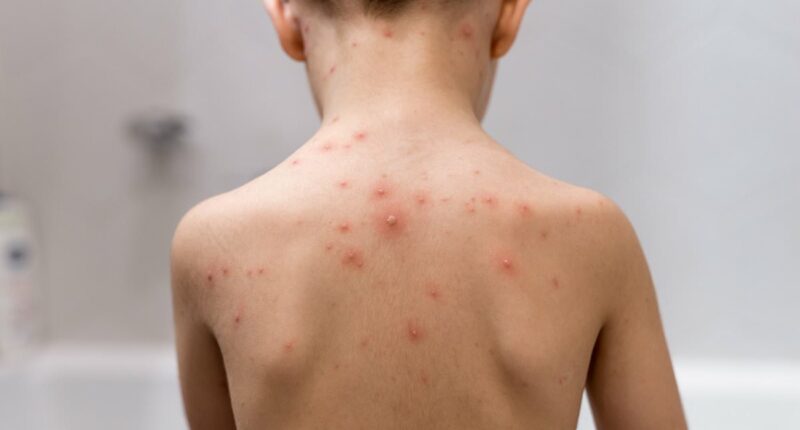Share this @internewscast.com
Getting infected with chickenpox may once have been accepted as a child’s rite of passage.
But that will soon be about to change.
Today, the NHS announced a significant update to its childhood vaccination program, stating that starting next year, all infants will receive the chickenpox vaccine, marking the most extensive expansion of this initiative in ten years.
Experts claimed the move would be a ‘life saver’ making chickenpox a problem of the past.
Ministers also claimed the vaccine, which is 98 per cent effective’, would save millions of sick days from school and nursery, sparing parents from ‘scrambling for childcare or having to miss work’.
The NHS, however, does face a battle to increase uptake of childhood jabs.
Data released yesterday revealed the number of children getting their MMR vaccine has collapsed to the lowest level for 15 years.
So how does the chickenpox vaccine work? Is the jab as effective as infection? And which children will be eligible? We set out everything you need to know…

The NHS today revealed it would begin vaccinating all babies against chickenpox next year, in the biggest expansion of the childhood immunisation programme for a decade
How rife is chickenpox?
It is considered a mild disease that the vast majority catch in childhood.
But children will feel unwell and will need to miss school or nursery for several days.
Some parents even deliberately expose their children to the virus to ensure they catch the bug while young, in so-called ‘parties’.
However, chickenpox can cause serious complications, such as pneumonia, brain inflammation—known as encephalitis—and bacterial infections.
In rare cases, these can be fatal. Hundreds of babies are hospitalised due to severe symptoms and on average 25 people die every year from the illness in England.
It can be dangerous in pregnancy, causing complications in both the mother and the baby.
Latest figures for England suggest roughly four in every 100,000 patients under the age of four attending the GP have chickenpox.
The August data, collated by the UK Health Security Agency (UKHSA), is based off reports from GPs.
But not every GP practice in the country takes part in the surveillance scheme, meaning the true figure could be higher.

Each infected person is thought to pass the virus on to 10 other people, making it more contagious than the common cold and flu, which each infected person gives to two others
How will the chickenpox vaccine work?
From January, the chickenpox—or varicella—vaccine will be combined with the measles, mumps and rubella vaccine into a new MMRV jab, replacing the MMR jab.
It is a live vaccine which means it contains a weakened version of the chickenpox virus.
As such, it is not recommended for those with a compromised immune system because of an illness like HIV or as a result of treatment such as chemotherapy.
The move will bring the UK into line with other countries which already offer routine varicella vaccination, including Germany, Canada, Australia and the US.
The vaccine doesn’t guarantee lifetime immunity, but it does greatly reduce the risk of someone developing chickenpox or having a bad case.
Serious side effects, such as a severe allergic reaction, are very rare.

Minister of State for Care Stephen Kinnock told the Daily Mail that ‘the benefits’ of the vaccine are ‘clear’ with ‘fewer working days being lost’
Is a vaccine as effective as infection?
Nine in 10 children who have a single chickenpox jab develop immunity, with the figure rising for those who have both doses, according to the NHS.
However, the health service warns that just three-quarters of vaccinated teenagers and adults will be protected against chickenpox as immunity wanes over time.
In comparison, almost all children develop and maintain immunity after getting infected, meaning most only catch it once, it suggests.
Is the chickenpox jab safe?
Experts have repeatedly said the jab is safe.
Common side effects include a sore arm, mild rash and high temperature. These symptoms are mild, short-lasting and in line with those caused by other vaccines.
Serious side effects, such as an allergic reaction, only occur in around one in one million people, according to the NHS.
Millions of doses of the vaccine have been given—including in the US, which has offered it since 1995—and there is no evidence of an increased risk of health problems.

In England, 89.3 per cent of two-year-olds received their first dose of the MMR vaccine in the year to March 2023 (blue line), up from 89.2 per cent the previous year. Meanwhile, 88.7 per cent of two-year-olds had both doses, down from 89 per cent a year earlier
The MMRV jabs, made by Merck & Co, carry a small seizure risk. US health chiefs estimate that one additional seizure occurs for every 2,300 doses given.
However, the Joint Committee on Vaccination and Immunisation (JCVI), said this ‘very small increased risk’ was not of clinical concern.
Meanwhile, countries that offer the vaccine have reported a significant drop in chickenpox cases and hospitalisations.
If it’s so safe, why hasn’t Britain rolled it out before?
It had previously been thought that vaccinating children against chickenpox would cause a problematic rise in shingles.
This often painful and debilitating condition is also caused by infection with the varicella-zoster virus.
However, has now repeatedly shown this is not the case, disproving the theory.
There was concern that a childhood vaccination programme might mean people who had not been exposed to the virus as a child could be more likely to develop chickenpox as adults, when cases can be more severe.
But health officials changed their position in 2023, when the JCVI recommended the jab for children after the latest evidence suggested that the benefits of the vaccine outweighed the risks.
The rollout will also bring the UK into line with other countries which already offer routine varicella vaccination, including Germany, Canada, Australia and the US.
Will my child be eligible for the jab?
It will be offered to more than half a million children each year in two doses, at 12 months and 18 months of age.
Health officials are considering whether to launch a catch-up programme for millions more under-fives.
But it is not thought the chickenpox vaccine will be made available to older children on NHS.
The shift to the new MMRV vaccine comes after health officials changed the schedule for the second MMR dose.
Previously, children received the second dose at three years and four months, but those born from July last year onwards will now have their second dose at 18 months old.
Who is already eligible for a chickenpox vaccine on the NHS?
The jabs are already available for free on the NHS to certain groups, including children and adults who are in regular or close contact with people who could become very ill from a chickenpox infection or have a weakened immune system.
A separate shingles vaccine is already available on the NHS for adults turning 65, those aged 70 to 79 and those aged 50 and over with a severely weakened immune system.
The chickenpox jab currently costs around £150 at private clinics and pharmacies.
What are the symptoms of chickenpox?
Common symptoms include an itchy, spotty rash that can appear anywhere on the body.
This may be accompanied by a high temperature, aches and pains and a loss of appetite.
Anyone who has chickenpox is advised to say off school, nursery or work until all the spots have formed a scab. This is usually around five days after the rash first appears.
In most cases, chickenpox usually clears up on its own within a couple of weeks, but some children can develop severe complications such as bacterial infections of the skin and soft tissue, including group A strep.








